The throbbing toothache is indeed a bitter experience. Not only tooth but ear and neck nerves are involved in this painful experience. You may start to search for the potential remedies to cure the pain. People often take the over counter pain reliever and forget about the pain. But this pain will return as the ghost of Hollywood movies if it is not treated.
Why does my toothache?
The most common cause of toothache is a tooth infection. Dental decay begins on the outside surface of the tooth and then the bacteria eat their way through the protective layer of enamel. Pain begins once the sensitive inside pulp and nerves of the tooth are exposed.
Dental abscesses cause pain. They are a bacterial infection caused by an infected tooth or gum disease. Left untreated an abscess can cause further complications leading to further pain and other complications, such as sinus infection, as the bacteria spread.
Some people have sensitive teeth that feel changes in temperature. Sensitivity itself is a sign that hard, protective tooth enamel has weakened, opening a pathway, however minuscule, to underlying tissues. It is possible that this lower level of pain will increase, especially if it indicates the beginning of a dental cavity.
Wisdom teeth, the very back molars, usually start to break through in the late teenage years. Pressure on the soft tissue or other teeth can lead to pain and infection which, if left untreated, can cause sudden inflammation.
Why only medicine does not work?
Pain killers are designed to relieve the pain for a certain period of time. It will not fix the cavity. The infection affected the nerve needs to treated and hence painkillers alone cannot solve them.
How should I treat the cavity?
the first step to treat the cavity is taking the appointment to the dentist. Your dentist will check how deep is the cavity and makes the treatment plan.
X-ray:
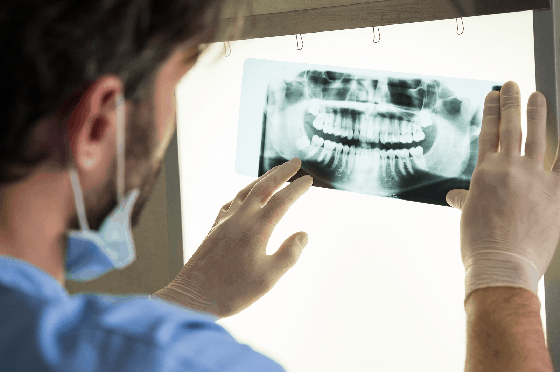
Sometimes the depth of the cavity is difficult to analyze by just visual examination. the dentist will take the X-ray for a better examination of the decay. It allows a dentist to make the best treatment plan.
How my cavity will be treated:
Fluoride treatments:
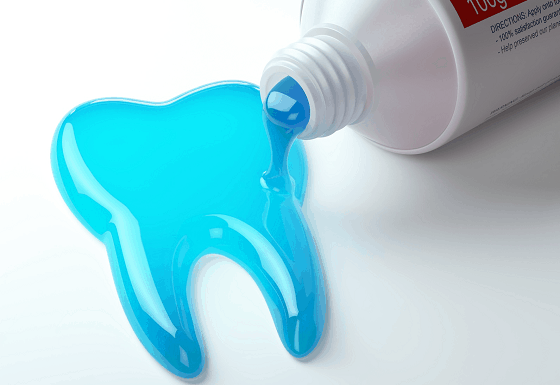
If your cavity just started, a fluoride treatment may help repair your tooth’s enamel and can sometimes reverse a cavity in the very early stages. Professional fluoride treatments contain more fluoride than the amount found in tap water, toothpaste and mouth rinses.
Fluoride treatments may be liquid, gel, foam or varnish that’s brushed onto your teeth or placed in a small tray that fits over your teeth.
Fillings:
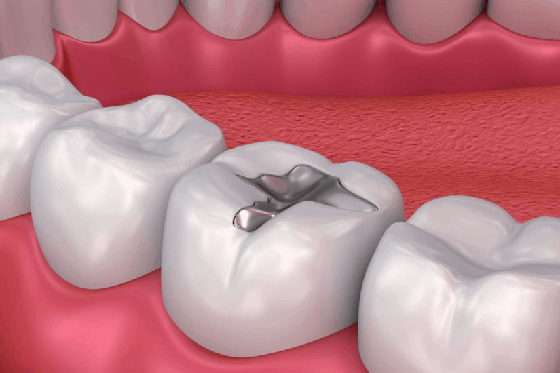
Fillings, also called restorations, are the main treatment option when decay has progressed beyond the earliest stage. Fillings are made of various materials, such as tooth-colored composite resins, porcelain or dental amalgam that is a combination of several materials.
Crowns:

For extensive decay or weakened teeth, you may need a crown — a custom-fitted covering that replaces your tooth’s entire natural crowns. Your dentist drills away all the decayed particles and enough of the rest of your tooth to ensure a good fit. Crowns may be made of gold, high strength porcelain, resin, porcelain fused to metal or other materials.
Root canal Treatment:
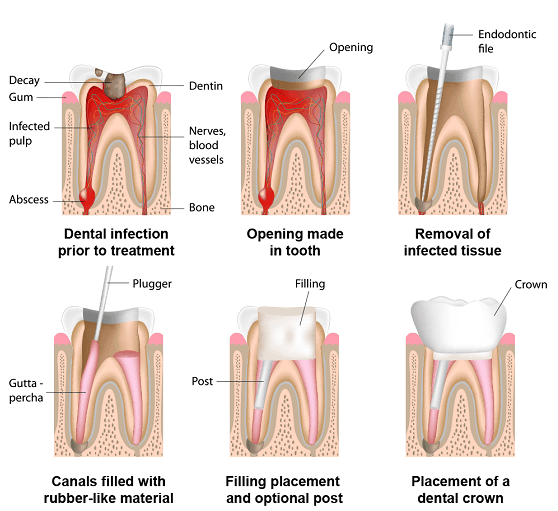
When decay reaches the inner layer of your tooth (pulp), you may need a root canal. This is a procedure to repair and save a badly damaged or infected tooth instead of removing it. The diseased tooth pulp is removed. Medication is sometimes placed into the root canal to clear any infection. Then the pulp is replaced with a filling.
Tooth Extraction:
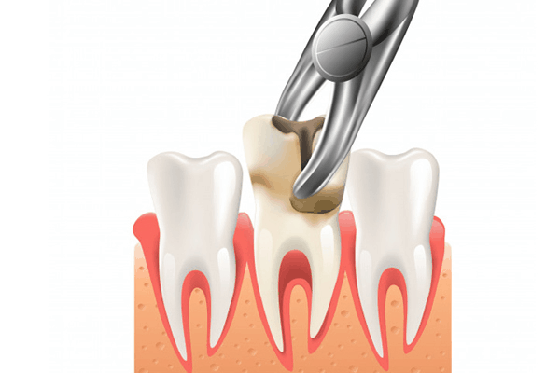
Some teeth become so severely infected that they can’t be restored and must be removed. Having a tooth removed can leave a gap that allows your other teeth to shift. If possible, consider getting a dental bridge or a dental implant to restore the missing tooth.
Can I prevent toothache?
In about 95% of cases, the pain of tooth decay is avoidable.
A good oral hygiene routine at home is important. These days there are great products on the market that help to maintain a healthy mouth such as fluoride toothpaste, mouth wash, floss, interdental brushes, and some people swear by tongue scraping too. It is worth considering investing in an electric toothbrush too.
Parents and guardians have a duty to ensure children and young people look after their teeth. Ask your dentist about topical fluoride treatments to help strengthen young teeth.
Everyone should see a dentist every six months. In some cases, a patient will need more regular dental checks.
Diet has a direct impact on our teeth. Try to cut down on sugar, especially in breakfast cereals and fizzy drinks, as well as cutting down on very salty or acidic food and drink.
In short, regular appointments with your dentist will keep you pain-free.
References:
Expert Opinion
Dr. Ankita Gada dental Director of Sabka dentist says “The early you seek a dentist appointment is better. A Patient who treated her tooth with mild ache has saved her original tooth structure. If you neglect further the infection will spread around and cause something severe”.
Dr. Jena Shah Dental director of Sabka dentist says “Maintaining a healthy mouth also means making regular appointments. A dentist can spot dental problems in the early stages and prevent pain occurring”.
Dr. Reena Waghela Dental Director of Sabka dentist says “Be proactive to prevent pain. Once oral health deteriorates, managing or restoring your teeth often means longer, more difficult and more costly treatments. It’s worth taking action at the very first signs of bleeding gums, sensitivity or toothache”.





